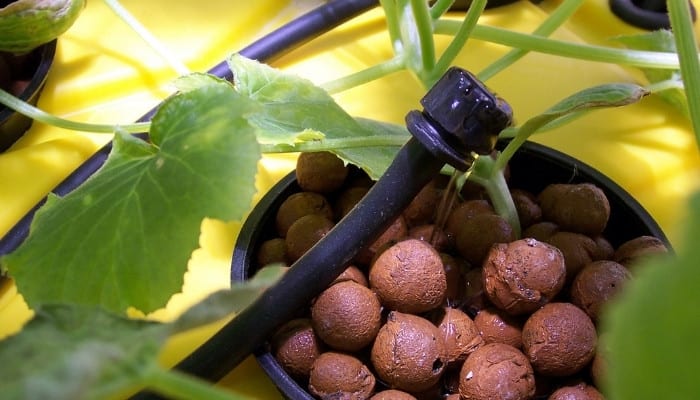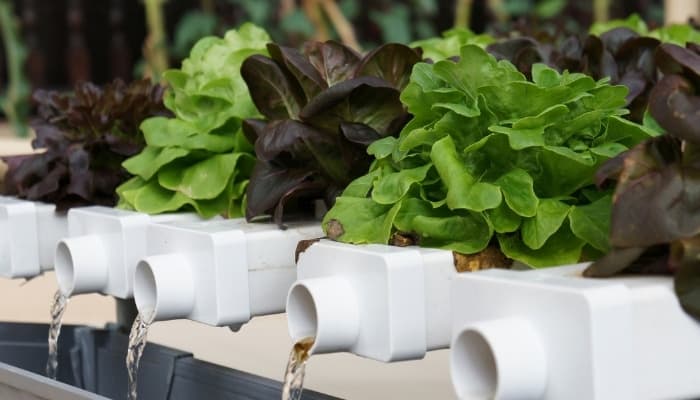Many individuals are intimidated by hydroponics primarily because they are concerned about managing nutrients.
Not only do you need to measure the nutrients properly, but more than likely you need to buy them as well (though DIY nutrients are totally a thing too).
The real question is if organic hydroponics is actually a thing.
Can hydroponics be organic? Hydroponics can be organic as long as no chemicals, pesticides, or artificial fertilizers are utilized in the system. Organic hydroponic nutrients may be derived from the all-natural byproducts of things like manure, plant matter, and more.
In the following, we’ll cover all aspects of organic hydroponic nutrients so that you can decide if that’s the route you want to take or not.
Organic Hydroponic Nutrients
Hydroponics probably isn’t the first type of gardening to pop into mind when you think about organic nutrients.
The thing is, hydroponics can be completely organic, including the nutrients you introduce to the system.
Whether you purchase your organic nutrients or create them yourself is up to you.
In the following sections, we further break down everything you need to know about organic hydroponic nutrients before you make any decisions!
Organic vs. Standard Hydroponic Nutrients
Not only do most organic hydroponic crops look better, but they actually taste and smell better in addition to being more nutritional as well.
Food grown in hydroponic growing systems with standard man-made hydroponic nutrients have lower levels of protein, nitrates, polyphenols, antioxidants, and vitamin C.
Organic hydroponic nutrients are made of compost, manure, bone meal, blood meal, fish meal, and other completely natural ingredients.
Standard hydroponic nutrients, on the other hand, typically contain the macronutrients nitrogen, phosphorus, magnesium, calcium, sulfur, and potassium.
They also contain a bunch of micronutrients as well, such as zinc, copper, manganese, and boron.
Why Most Hydroponic Nutrients Are Not Organic
One of the most significant reasons that hydroponic nutrients avoid completely organic substances like manure is because of the risk of serious bacterial contaminants.
Another common reason is that many hydroponic nutrient products include some sort of man-made ingredient, even if only in trace amounts.
Additionally, many people are concerned about the potential for clogging their system when using organic nutrients, so they opt for standard nutrients.
This, of course, increases the demand for standard nutrients and lowers the demand for organic ones.
Is It Possible To Have a 100% Organic Hydroponic System?
It is more than possible to have a 100% organic hydroponic system, though it can be a bit tricky.
You won’t be able to use most man-made fertilizers or pesticides, for starters. Your system may also be more susceptible to algae or bacterial problems.
That said, it is possible to have a fully organic system. You can even get an official certification to show that your produce is organic even though it’s hydroponic.
Benefits of Using Organic Hydroponic Nutrients
The first and biggest advantage to using organic nutrients for hydroponics is that it’s packed with all the right stuff.
The second big benefit is that it is way cheaper to use organic nutrients if you make them yourself.
Another consideration is that you are able to have certified organic produce if you use all-natural techniques and nutrients.
Difficulties With Organic Hydroponic Nutrients
As you may have already guessed, the biggest challenge with organic nutrients for hydroponics is the fact that much of it contains manure.
Manure is great in the soil, but in hydroponics concentrated amounts it may cause bacterial issues and contribute to other problems, such as system clogs.
Another issue is finding a supplier that doesn’t run out of product and is affordable enough for the long run.

What Types of Organic Fertilizers Can Be Used in Hydroponics?
The best organic fertilizer for your hydroponic system depends on the crops you’re growing. That said, there are never-ending possibilities when you get right down to it.
A few of the best types of common organic fertilizer used for hydroponics are:
- Manure based
- Fish meal
- Gypsum based
- Bone meal
- Guano
- Blood meal
- Compost based
- Plant based
These ingredients can also be mixed and matched depending on your system and crop species.
Is NPK Enough for Hydroponics?
NPK is necessary for hydroponics, but it isn’t all that’s needed for plants to grow and thrive by any means.
An NPK of 15-15-15 is used by many hydroponic gardeners. However, calcium, sulfur, copper, boron, zinc, iron, manganese, and many other macro and micronutrients are necessary as well.
Does Compost Tea Provide Enough Nutrients for Hydroponics?
Whether or not your compost tea provides enough nutrients for your hydroponic operations is entirely dependent on what you put in it.
It is certainly possible to add enough good ingredients into the compost and thus the tea to provide the right amount of nutrients for the plants growing in your system.
At the same time, it isn’t unusual for hydroponic gardeners to use pH adjusters after adding compost tea to their systems.
Does Vermicompost Tea Provide Enough Nutrients for Hydroponics?
Vermicompost tea is a powerful nutrient source for hydroponic gardeners to feed their plants.
These teas typically include all of the essential amounts of macro and micronutrients for plants to get everything they need.
If you try out vermicompost tea, just make sure to do your normal pH and PPM checks and adjust as needed.
Can Aquaponics Be Organic?
Aquaponics can be every bit as organic as hydroponics. In fact, when you get right down to it, aquaponics may be one of the most organic forms of hydroponics there is.
The fish provide the nutrients, the plants clean the water and provide oxygen, and the cycle continues.
So long as what you are feeding your fish is all natural, the entire aquaponic system may be organic certified.
Is It Worth Trying Organic Nutrients in Hydroponics?
Only you can decide whether or not trying organic nutrients in hydroponics is the right move for you or not.
Keep in mind that in the beginning, you’d more than likely need to purchase some, although after a while, you can make them yourself.
If you have the time and the ingredients, it sure couldn’t hurt to run an experiment at the very least.
Best Organic Hydroponic Nutrients
When it comes to buying organic hydroponic nutrients, don’t be suckered by lesser products with higher price tags.
Our top 3 picks for the best organic nutrients to try in your hydroponics system are:
AgroThrive All Purpose Organic Liquid Fertilizer
This safe-to-use all-purpose organic liquid fertilizer from ArgoThrive has an NPK of 3-2-2. It is mainly comprised of fish and grain and works on all crops.
Unlike many organic nutrients, up to 30% of this formula is slow-release nutrients. That means the plants feed on each dose longer.
The product is easy to use and available in sizes ranging from 64 ounces to 2.5 gallons.
General Organics BioThrive
Another excellent organic hydroponic nutrient product to consider for your hydroponics is the General Organics BioThrive.
It has an NPK of 4-3-3 and works well in both hydroponics and soil-based growing.
For hydroponic use, it provides plants with all the macro and micronutrients they need to grow and thrive. It is available in a convenient 1-quart container.
Liqui-Dirt
This super-impressive organic hydroponic nutrient product is one of the best you can get your hands on right now.
It’s made up of over a dozen and a half all-natural ingredients that mix into a universal balanced nutrient solution for hydroponic plants.
Liqui-Dirt even includes micro-fungal material and living bio-organisms as well.
Organic Hydroponic Nutrients DIY
There are numerous techniques for creating DIY organic hydroponic nutrients. Below, we’re providing you with a few easy to follow universal steps for making organic liquid nutrient tea:
- Place your organic matter into a large bucket or container (plant matter, worm castings, compost, and manure are common)
- Fill the container with water until the organic matter is completely covered
- Cover the container with cheesecloth or similar material
- Return after a designated amount of time (24 hours, 48 hours, and 72 hours are common)
- Filter the tea through the cloth and into an additional container (and set the matter to the side or dispose of it)
That’s really all there is to it! Just be sure not to contaminate anything during the process or add any ingredients into the mix that are tainted with pesticides or chemicals.
Conclusion
If you’re thinking about getting started with organic hydroponic nutrients, we applaud you. The task is more than possible, but it won’t necessarily be without a learning curve.
That’s why we suggest picking up some organic nutrients from one of the well-known producers mentioned above even if you plan to make your own in the long run.

